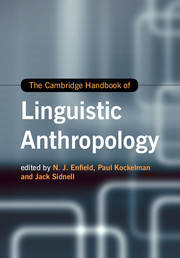Book contents
- The Cambridge Handbook of Linguistic Anthropology
- Series page
- The Cambridge Handbook of Linguistic Anthropology
- Copyright page
- Dedication
- Contents
- Figures
- Tables
- Contributors
- 1 Introduction
- Part I System and function
- Part II Process and formation
- Part III Interaction and intersubjectivity
- Part IV Community and social life
- 19 Poeticsand performativity
- 20 Ritual language
- 21 Oratory, rhetoric, politics
- 22 Language and media
- 23 The speech community and beyond
- Part V Interdisciplinary perspectives
- Index
21 - Oratory, rhetoric, politics
from Part IV - Community and social life
Published online by Cambridge University Press: 05 October 2014
- The Cambridge Handbook of Linguistic Anthropology
- Series page
- The Cambridge Handbook of Linguistic Anthropology
- Copyright page
- Dedication
- Contents
- Figures
- Tables
- Contributors
- 1 Introduction
- Part I System and function
- Part II Process and formation
- Part III Interaction and intersubjectivity
- Part IV Community and social life
- 19 Poeticsand performativity
- 20 Ritual language
- 21 Oratory, rhetoric, politics
- 22 Language and media
- 23 The speech community and beyond
- Part V Interdisciplinary perspectives
- Index
Summary
Keywords
- Type
- Chapter
- Information
- The Cambridge Handbook of Linguistic Anthropology , pp. 537 - 558Publisher: Cambridge University PressPrint publication year: 2014
- 2
- Cited by

